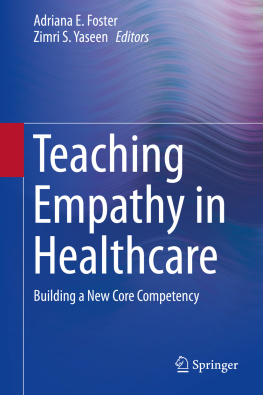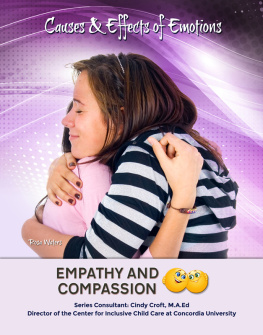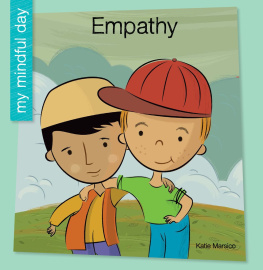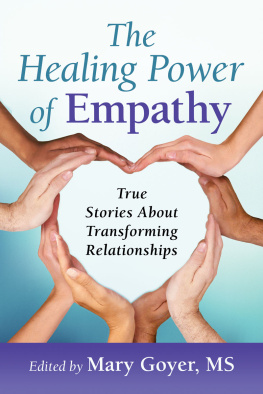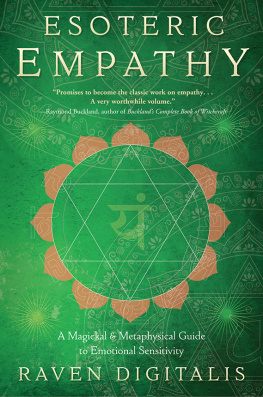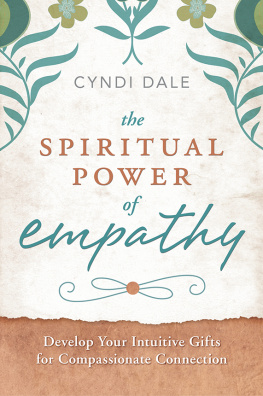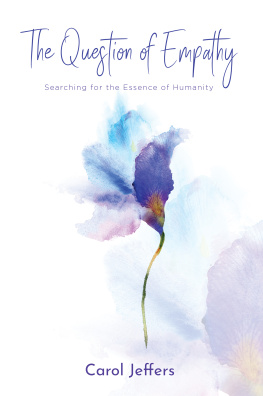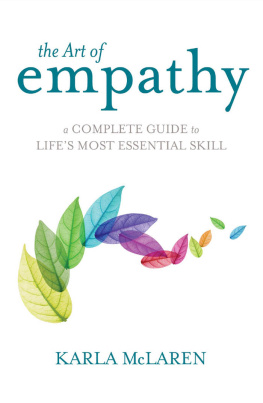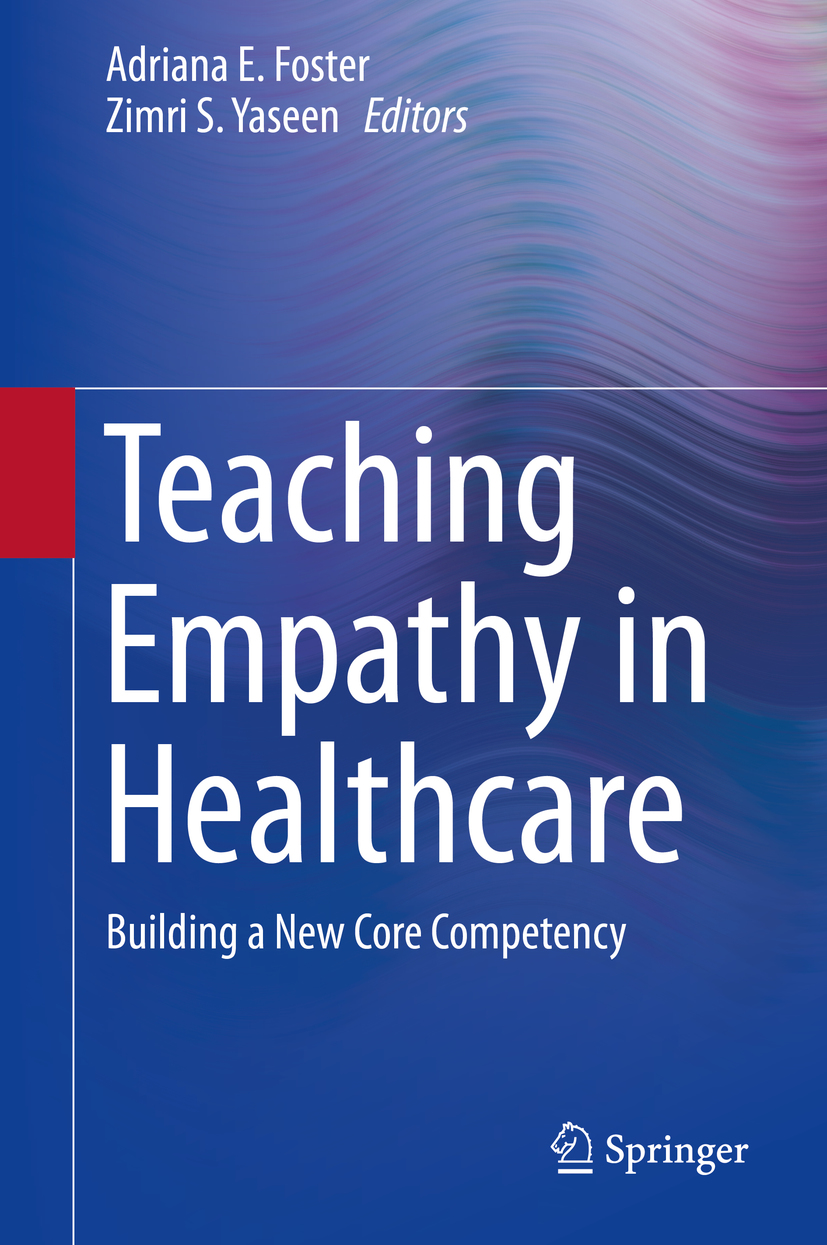Editors
Adriana E. Foster and Zimri S. Yaseen
Teaching Empathy in Healthcare
Building a New Core Competency
Editors
Adriana E. Foster
Department of Psychiatry and Behavioral Health, Herbert Wertheim College of Medicine, Florida International University, Miami, FL, USA
Zimri S. Yaseen
Department of Psychiatry and Behavioral Health, Icahn School of Medicine, Mount Sinai Beth Israel, New York, NY, USA
ISBN 978-3-030-29875-3 e-ISBN 978-3-030-29876-0
https://doi.org/10.1007/978-3-030-29876-0
Springer Nature Switzerland AG 2019
This work is subject to copyright. All rights are reserved by the Publisher, whether the whole or part of the material is concerned, specifically the rights of translation, reprinting, reuse of illustrations, recitation, broadcasting, reproduction on microfilms or in any other physical way, and transmission or information storage and retrieval, electronic adaptation, computer software, or by similar or dissimilar methodology now known or hereafter developed.
The use of general descriptive names, registered names, trademarks, service marks, etc. in this publication does not imply, even in the absence of a specific statement, that such names are exempt from the relevant protective laws and regulations and therefore free for general use.
The publisher, the authors, and the editors are safe to assume that the advice and information in this book are believed to be true and accurate at the date of publication. Neither the publisher nor the authors or the editors give a warranty, express or implied, with respect to the material contained herein or for any errors or omissions that may have been made. The publisher remains neutral with regard to jurisdictional claims in published maps and institutional affiliations.
This Springer imprint is published by the registered company Springer Nature Switzerland AG
The registered company address is: Gewerbestrasse 11, 6330 Cham, Switzerland
To Steve and Brent for their unconditional love, support, humor, and wit.
Adriana E. Foster
To Dilu for her loving challenge.
Zimri S. Yaseen
Foreword
All clinicians seek to deliver high-quality healthcare. That is why we have become doctors, nurses, or allied healthcare professionals in the first place. We care about our patients, and we want to be able to give them the most effective care possible, in order to cure their diseases or, when cure is not possible, alleviate symptoms and maximize health. Why? Because health is a resource for living. Our job is to help people live well.
Nowadays, the young clinician is bombarded with a variety of concepts to understand and learn to integrate into everyday work: evidence-based medicine, technical skills, communications skills, shared decision-making, self-management support, patient activation, patient empowerment, health literacy, to name but a few. But do they understand that empathy is fundamental to all of these? And are they taught the art and science of empathy? Do they know how to improve their empathy and how to get the professional balance rightthe right amount of empathy, at the right time? And do they understand the wider determinants of health and the way that empathy can be undermined or thwarted by the high pressureand at times brutalizingenvironment that healthcare often operates in?
If (as I suspect is often the case) the answers to many of these questions is no, then help is at hand.Teaching Empathy in Healthcare: Building a New Core Competency, edited by Adriana Foster and Zimri Yaseen, and with contributions from over 40 co-authors, is a comprehensive, up-to-date account of empathy in the clinical context. Set to become a classic text on the subject, the book takes the reader on an engaging three-part journey from understanding what empathy is (and how it can be measured) to approaches to empathy education, and finally to a systemic perspective, addressing issues such as equity, stigma, and law. Each section is packed full of the latest evidence-base, including the remarkable strides that have been made over recent decades in the neurobiology of empathy.
Although many books have been written on empathy in medicine over the last 20 years or so since I became active in research in this area, this new book is different from those that have come before. It draws on a very wide range of contributors across many disciplines and takes an unashamedly evidence-based approach. It takes a longitudinal approach to clinical empathy, emphasizing the benefits of embedding empathy training in undergraduate and post-graduate curricula, but also the need to reinforce the importance of empathy according to the clinicians stage of professional development. Empathy is not something to be learnt quickly in first year of medical school, but a professional skill and attitude for the entire clinical career. Finally, and very importantly, it broadens its scope to include the societal and institutional factors that relate to whether empathy is fostered and nurtured, or not, within our healthcare systems.
I enjoyed reading this book, and I learned a lot from it. I am sure you will too. Enjoy, digest, imbue, share, and implement! Our patients deserve nothing less.
Stewart W. Mercer
June 2019
Acknowledgment
The authors thank Anjelica Halim, Laura Ayala, and Emily Jurich who, in addition to their contributions as chapter authors, provided essential editorial assistance for this book. We also thank Sarai Yaseen and Phil Kao for their editorial assistance and Phil Kao, Chris Barnes, and Jason Sharpe for their constructive discourse.
Contents
Part I What Is Empathy and How Can It Be Evaluated?
Zimri S. Yaseen and Adriana E. Foster
Michelle Trieu , Adriana E. Foster , Zimri S. Yaseen , Courtnie Beaubian and Raffaella Calati
Anjelica J. Halim , Adriana E. Foster , Laura Ayala and Erica D. Musser
Gabriel Sanchez , Melissa Ward Peterson , Erica D. Musser , Igor Galynker , Simran Sandhu and Adriana E. Foster
Part II Approaches to Empathy Education
Tamara Zec and David Forrest
Zimri S. Yaseen , Sarah Bloch-Elkouby and Shira Barzilay
Lauren M. Lipner , Di Liu and J. Christopher Muran
James W. Lomax and Adriana E. Foster
Benjamin Lok and Adriana E. Foster
Gregory Schneider , Marin Gillis and Heidi von Harscher
Carissa Cabn-Alemn , Jordanne King , Auralyd Padilla and Jeanie Tse
Jean Hannan , Mark Fonseca , Edgar Garcia Lara , Mercedes Braithwaite , Faith Irving and Elizabeth Azutillo
Sangeeta Lamba , Anastasia Kunac and Anne Mosenthal
Part III Empathy: A Systemic Perspective
Javeed Sukhera
Rabia Khan and Maria Athina (Tina) Martimianakis
Aniuska M. Luna , Emily Jurich and Francisco Quintana
Natalie Castellanos and Marin Gillis
Christopher M. Woleben and Peter F. Buckley
Contributors
Laura Ayala
Florida International University, Miami, FL, USA
Elizabeth Azutillo
Nicole Wertheim College of Nursing and Health Sciences, Florida International University, Miami, FL, USA

